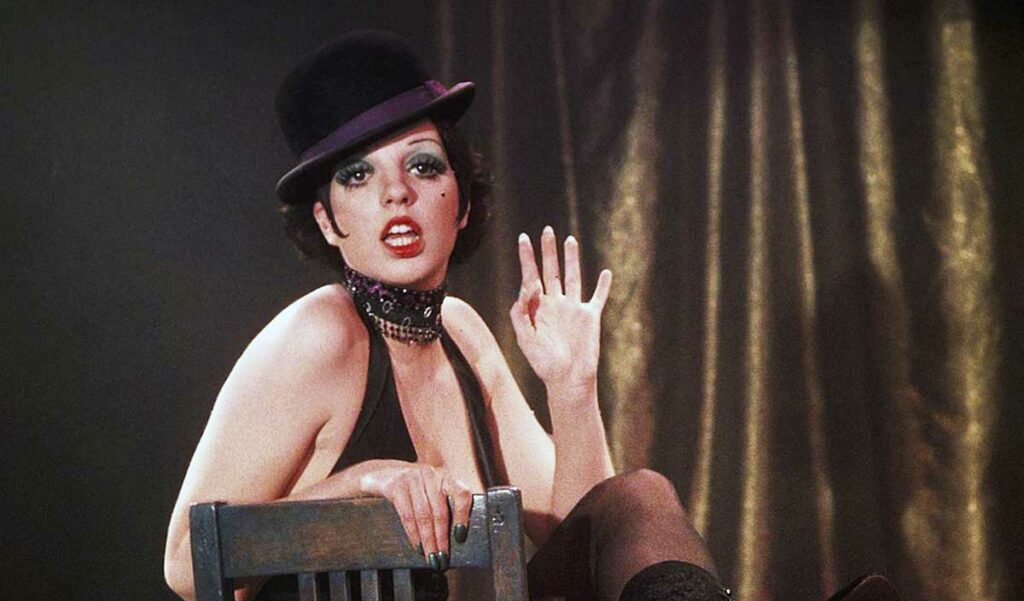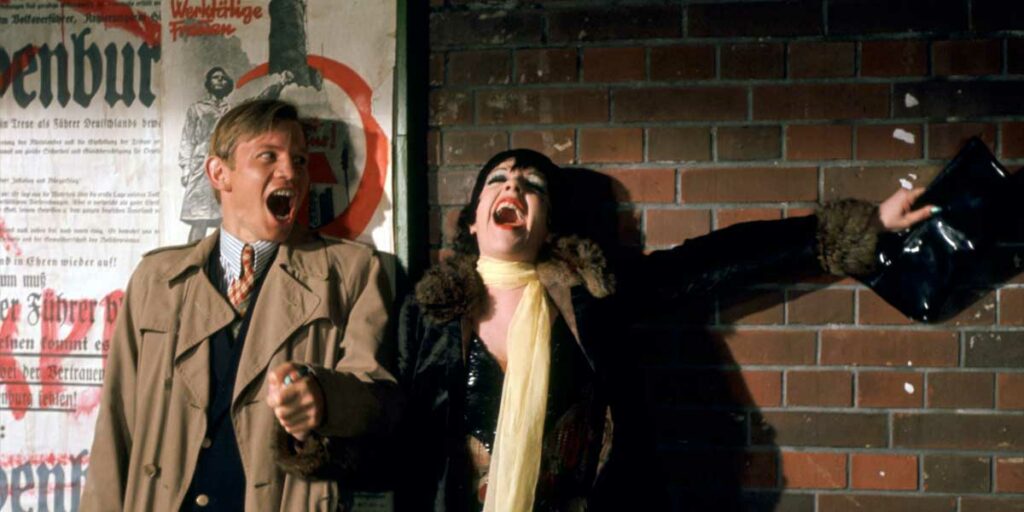With its unique and provocative musical numbers, Cabaret (1972) shines the brightest when its stars take center stage, though its plotting can be inconsistent.
Stage musicals can be notoriously difficult to adapt into films: while you’ll sometimes get a Chicago (2002) or a The Sound of Music (1965), it seems just as often there are bad or polarizing musical adaptations every year. It can be difficult to find that resolution between a musical’s inherent fantastical diegesis, and a film audience’s potential expectations for a certain level of realism. Enter Cabaret (1972), an odd addition to the movie musical genre in that it was released many years after the heyday of the Hollywood movie musical, but well before the small boom of successful and acclaimed musicals in the early-2000s. Released at a time of limbo for the movie musical, Cabaret nonetheless opened in 1972 to great praise, leading to a big night at the Academy Awards, where the film earned eight oscars. With such an illustrious fifty year history, however, how does Bob Fosse’s 1972 opus hold up?
Set in 1931 Berlin, Cabaret follows Sally Bowles (Liza Minnelli), an American cabaret performer, and Brian Roberts (Michael York), a British academic teaching English in the city. Sally and Brian navigate their blossoming relationship and their bohemian lifestyle in front of a backdrop of rising fascism during the final days of the Weimar Republic.
Cabaret is a unique case in that the film’s plot is driven less by narrative and more by aesthetic and themes; if you were to read a summary of the plot on Wikipedia, you may not think it seems like anything special. But where Cabaret succeeds the most, however, is in its presentation. The narrative is interspersed with songs taking place at the Kit Kat Klub, the titular cabaret theater. The songs always in some way reflect important plot points, serving a similar function to that of a Greek chorus.
The musical numbers are truly the highlights of the film, with almost all of them delivered by either Sally or by the Master of Ceremonies (Joel Grey). The way Cabaret interweaves cinematic techniques with the stagecraft of a theater production creates an arresting visual experience; the cinematography is particularly good, with the camera engaging in some acrobatics mirroring and complementing the dancers’ choreography. Minelli and Grey give spirited and memorable performances, delivering a vaudevillian style of camp over an old-timey jazz score. For real, the musical numbers alone make the film worth watching, to the point where the actual narrative almost feels like set dressing or a vehicle to get to the next song.

Outside of singing and dancing, Minnelli’s performance as Sally Bowles is exceptional: it’s clear how this role earned her an Oscar. Her Sally is so spirited and big on personality, she steals the scene any time she’s on screen. This is not to discredit her scene partners: Michael York presents a great straight-laced academic type to act as a cool-headed foil to Minelli’s seemingly infinite energy and charisma. And a scene-stealer himself, Joel Grey is also fantastic at the MC, effortlessly assimilating into the camp you’d expect from a vaudeville performer in a seedy cabaret.
Now, while there certainly is a lot to like about Cabaret (especially given how, at the time, to be so overt and explicit in its themes of sex, sexuality, and violence was groundbreaking), not everything about it holds up so well. As I hinted at earlier, outside of the musical numbers, the plot is… fine. It’s nothing to write home about (it’s not exactly full of twists and surprises), but it mostly gets the job done. Outside of Sally and Brian, there’s a subplot about another couple trying to get together, and it feels really tacked-on and not fleshed out. Perhaps it’s better in the stage show and simply got lost in adaptation, but I haven’t seen the stage show, so I’m only able to review the film in front of me.
Finally there’s Cabaret’s depiction of Nazism’s rise in Germany. I’m not going to tell you that it’s always handled well: during the song “Tomorrow Belongs to Me,” a Nazi Youth sings in a beer garden and inspires nearly everyone to sing with him, and the film’s framing of the scene glorifies the whole affair a bit too much. I’m certain glorification was not the intention, and I understand that the song was made by two Jewish men, but there’s a reason the song has become an adopted anthem by several alt-right and neo-nazi groups.
There are other times, however, when German fascism’s rise is presented in a more appropriately horrifying manner: throughout much of the film, it’s presented as this insidious creeping thing, growing in the background presented in the mise-en-scène through propaganda posters and character behaviors: the characters don’t truly know the danger it presents but the audience does, creating a meta sense of dread. One of the most poignant instances of this sort of imagery is a scene where the cabaret performers are performing a satirical dance in military garb and lingerie. The dance is juxtaposed with shots of young nazis defacing a Jewish woman’s home and planting a dead dog on her doorstep while chanting “Juden”; the scene shows how being too dismissive towards the far right and the absurdity that permeates within it can leave you blind to the violence and harm they are currently perpetuating.
There are many damn good reasons why we’re still celebrating Cabaret fifty years after its initial release. The performances are excellent, the theming is solid and (mostly) well-presented, and the musical numbers alone are worth the price of admission. It’s not without flaws that can be easily exploited by bad-faith actors, but for the sake of cultural literacy and for viewing classic movie musicals, Cabaret is definitely worth your time.
To celebrate its 50th anniversary since the release, Cabaret (1972) will be back in cinemas across the UK from May 6, 2022.

